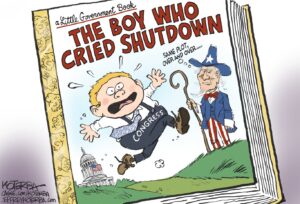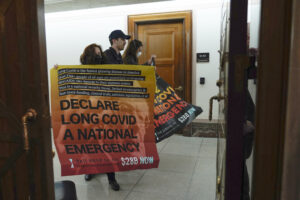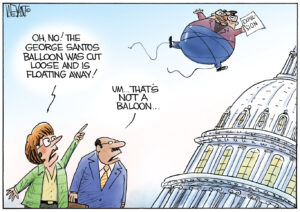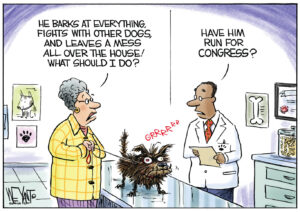On Unemployment, Today’s Congress Is Meaner Than George W. Bush
Why are we arguing about issues that were settled decades ago? Why, for example, is it so hard to extend unemployment insurance at a time when the jobless rate nationally is still at 7 percent, and higher than that in 21 states?
Why are we arguing about issues that were settled decades ago? Why, for example, is it so hard to extend unemployment insurance at a time when the jobless rate nationally is still at 7 percent, and higher than that in 21 states?
As the Senate votes this week on help for the unemployed, Democrats will be scrambling to win support from the handful of Republicans they’ll need to get the required 60 votes. The GOP-led House, in the meantime, shows no signs of moving on the matter.
It hasn’t always been like this. It was not some socialist but a president named George W. Bush who declared: “These Americans rely on their unemployment benefits to pay for the mortgage or rent, food, and other critical bills. They need our assistance in these difficult times, and we cannot let them down.”
Bush spoke those words, as Jason Sattler of the National Memo noted, in December 2002, when the unemployment rate was a full point lower than it is today.
Similarly, raising the minimum wage wasn’t always so complicated. The parties had their differences on the concept, but a solid block of Republicans always saw regular increases as a just way of spreading the benefits of economic growth.
The contention over unemployment insurance and the minimum wage reflects the larger problem in American politics. Rather than discussing what we need to do to secure our future, we are spending most of our energy re-litigating the past.
A substantial section of the conservative movement is now determined to blow up the national consensus that has prevailed since the Progressive and New Deal eras. The consensus envisions a capitalist economy tempered by government intervention to reduce inequities and soften the cruelties that the normal workings of the market can sometimes inflict.
This bipartisan understanding meant that conservatives such as Bush fully accepted that it was shameful to allow fellow citizens who had done nothing wrong to suffer because they had been temporarily overwhelmed by economic forces beyond their control.
The current debate is flawed for another reason: It persistently exaggerates how divided we are. Of course there are vast cultural differences across our nation. It’s not just a cliche that the worldview of a white evangelical Christian in Mississippi is quite distant from the outlook of a secularist on Manhattan’s Upper West Side. African-Americans, Latinos, Asians and whites can offer rather diverse interpretations of the meaning of our national story.
But on core questions involving social justice, we are far more united than our politics permits us to be. A survey released at the end of December by Hart Research, a Democratic polling firm, found that Americans supported extending unemployment insurance by a margin of 55 percent to 34 percent. Several recent surveys, including a Fox News poll, found that about two-thirds of Americans support an increase in the minimum wage.
This leads to two conclusions. The first is that most Americans broadly accept the New Deal consensus. We may disagree about this or that regulation or spending program. We may squabble over exactly how our approaches to policy need to be updated for a new century. But there is far more agreement among the American people than there is among Washington lobbies, members of Congress or political commentators on the core proposition that government should help us through rough patches and guarantee a certain level of economic fairness.
The second conclusion is that we have to stop letting the politics of culture wars so dominate our thinking that we forget how much we share when it comes to life’s day-to-day struggles and what we can do to ease them. Disputes over personal morals and lifestyle choices may get more page views or rating points, but they do little to improve anyone’s standard of living.
The minimum wage increase is typically labeled a “liberal” idea. Yet many grass-roots Republicans see respect for those who work hard as rooted in sound conservative principles demanding decent compensation for a day’s labor. An evangelical might see fair pay as a biblical imperative while a secularist might view the question through a more worldly philosophical prism. Nonetheless, their distinctive reasoning processes lead them to the same place.
President Obama’s old line challenging the idea of red and blue Americas unalterably opposed to each other seems terribly outdated or naive. Electorally, at least, those divisions are still painfully obvious. But on matters of economic justice, we shouldn’t let a defective political system distract us from what we have in common.
E.J. Dionne’s e-mail address is ejdionne(at)washpost.com.
© 2014, Washington Post Writers Group
Your support matters…Independent journalism is under threat and overshadowed by heavily funded mainstream media.
You can help level the playing field. Become a member.
Your tax-deductible contribution keeps us digging beneath the headlines to give you thought-provoking, investigative reporting and analysis that unearths what's really happening- without compromise.
Give today to support our courageous, independent journalists.









You need to be a supporter to comment.
There are currently no responses to this article.
Be the first to respond.